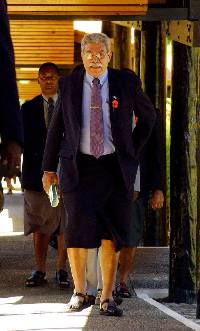
Ambassador to the U.S has some novel ideas up his sleeve to widen Fiji's profile in Washington. Ideas aside, the real substance which turn heads are exceptionally great products. Be it Water, Furniture or Movies that is the basic degree of excellence that exporters must be continually aware of. No amount of marketing can ever attract or retain a loyal customer base.
Fiji's SPARTECA agreement with Australia needs a closer inspection, after the matter was covered in the Fiji news recently. The Fiji Garment industry are adamant that that the clause of local content attached to many of Australia's trade deals, unfairly burdens them by the high costs of many Australian textiles.
An example of this demand is: Australia wants all business suits to contain 50% Australian made textiles like wool or cotton. A cheap way of contracting residual revenue and protecting the domestic market from foreign competition.
Despite the Australian Government's job of disguising these trade barriers under some gray legal justifications, these trade barriers are the hindrance to the development of Pacific economies.
Report on Australian Security in 21st Century South Pacific.
Australia has many complaints made against their unethical trade policies. World Trade organization website outlines these, many of which are still pending.
What is surprising that some of these cases involve the U.S Government who recently cemented a free trade agreement with the Australians, as a present for their involvement in the Iraq war.
Fiji business tycoon- Hari Punja.

Noting from the other disputes before the World Trade Organization, it only further highlights Fiji's infancy in global trade. Moreover, with the declining exports such as Sugar and the change of traditional revenue streams like tourism being surpassed by the influx of foreign remittances by Fiji nationals; hopefully the economy will be further diversified by enterprising locals using this influx of cash in stagnant economy.

Another growing industry-Sports has been conveniently under developed in Fiji by the Pacific neighbors. Australia's routine abuse of smaller Pacific islands by dumping their products and also demanding a litany other additionals, when asked to open up their own domestic markets for island exports.
Rugby is also an industry that mirrors the plight of other island exports. It is also one product that pacific big brothers (Aust. and N.Z) have little capacity of their own to create gifted players. Although, these nations do own the competitions which these island ruggers owe their living to. It would be an expression of good faith to remove the controversial nation eligibility clauses; as a criteria for the Super 14 Rugby inter club league. An industry that is seldom scrutinized with the same international standards demanded by other ventures like mining or oil exploration. It is no wonder that player poaching by these larger nations in Rugby, is another extension of this arrogance of disposable and cheap morals.
This is an excerpt from the Pacific Plan (PDF format)-the Australia funded policy initiative that is supposed to solve Pacific island problems. The same problems like the over-zealous trade barriers imposed by these Colonial cut-outs.
Club theory and some principles successful regionalism
When assessing Pacific regionalism, the economic theory of clubs contains important lessons. Club theory has been applied to a wide range of contexts, including military alliances, international organizations, and cross-border infrastructure and services. Club groupings of agents, firms, or countries— have different characteristics that make them amenable to different groupings. Yet any collective endeavor or club must satisfy two basic conditions.
1. A club must be self-sustaining.
2. A club must provide a large enough pool of net benefits for each of its members.
The success or failure of a club depends on its benefits exceeding its costs. Economies of scale. The reduction in unit cost resulting from pooling productive capacities are offset by the costs of collective action.
These costs effectively limit the size and scope of a club. In the Pacific, adding more remote countries entails higher diseconomies of isolation the high cost of shipping goods, services, information, and people to increasingly remote countries across the region.
From this tension between scale benefits and distance costs of collective action, the "optimal club" (in this case, a group of countries), can be derived. The composition of the "optimal club" may vary significantly according to the issue or service under consideration.
Fiji P.M in Parliament.

Club Em Designs

Hmmm. It's Pick on Australia today is it? Okay, point conceded, as the current Australian foreign policy is selfish.
ReplyDeleteRe. the garment industry - Australian workers demand about $14 and hour so there's no hope of a local industry. Fiji workers get about $2 an hour. But if the out-sourcing is in Asia maybe the labourers get 40c an hour. Re Australian wool/cotton etc. there is an attempt at safe-guarding some of our industries.
I am constantly disappointed in our current Australian government in many ways - one is the refusal to really consider Pacific Islanders as guest workers in the fruit industry because we know that farmers in the Murray Valley region really like Islanders as their workers.
W.